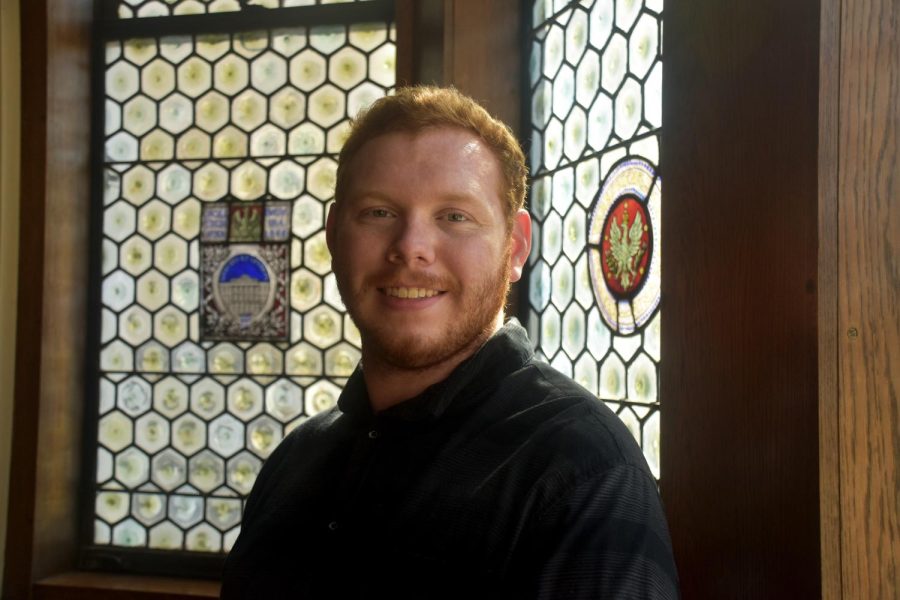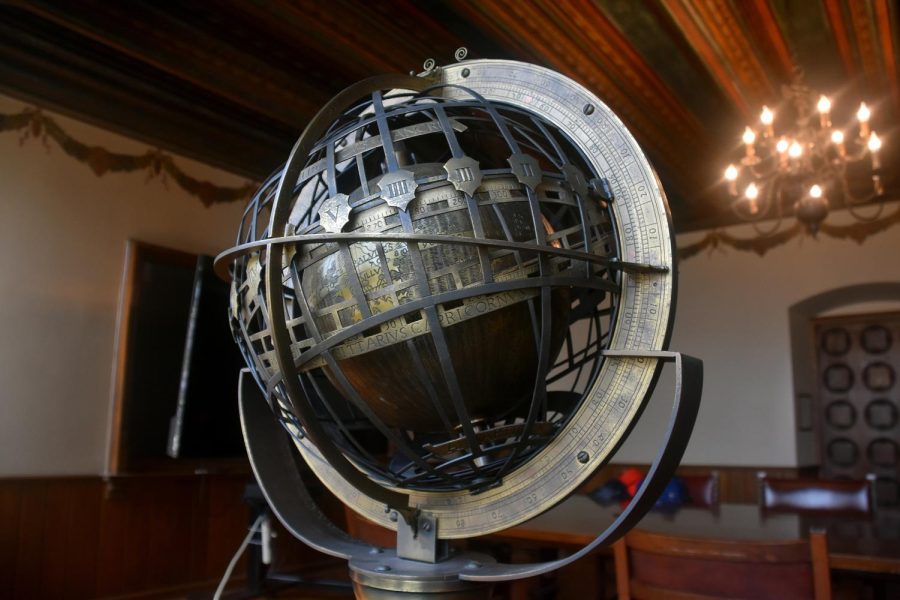Nationality Room tour guides gain cultural, educational experience
Amaya Lobato | Staff Photographer
Zach Hartman, a computer engineering and classics major, nationality room tour guide and the Quo Vadis president in the Cathedral of Learning’s Polish nationality room on Monday.
March 2, 2022
The Polish room in the Cathedral of Learning is packed with intricate artifacts representing the eastern European nation’s culture. The room contains the original handwritten manuscript of “Manru,” the first and only Polish opera performed at The Metropolitan Opera in New York. The composer, Ignacy Jan Paderewski, donated the manuscript to the Polish room.
Zach Hartman, a senior computer engineering and classics major, works as a nationality room tour guide and Quo Vadis president. Quo Vadis members serve as tour guides for the Cathedral’s 31 nationality rooms. Currently, there are about 25 tour guides. Hartman said the manuscript is one of the Polish room’s most distinctive artifacts.
“It’s the original handwritten pencil manuscript of the opera,” Hartman said. “[Paderewski] wants us to turn the page every once in a while so that people can read the whole opera after a certain amount of time.”
According to Hartman, then-chancellor John Bowman commissioned the Cathedral when the University moved its campus to Oakland. The Cathedral became Pitt’s iconic homebase, and the nationality rooms program encouraged the people of Pittsburgh to represent their heritages in the building.
“[Bowman] wanted the Cathedral to be part of the community, rather than just isolated to the University,” Hartman said.
Hartman said he attended tour guide training sessions during his first year at Pitt, where he discovered his love for learning about the cultures that the rooms represent.
“I went to a couple of the meetings and started going to trainings just to see what Quo Vadis was all about,” Hartman said. “I just kept coming back because I wanted to learn more and more about every single room — I thought it was a cool way to learn about this aspect of the University that not many people actually look into.”
Quo Vadis members usually complete tour guide training sessions within the span of a semester, during which they learn about every item in each of the nationality rooms. Once students complete training, they get paid for the tours they give.
Guests not affiliated with the University frequently go on the tours, and can choose which nationality rooms to tour when they book the tour online.
Hartman said while interacting with people can be a challenge, working as a tour guide has helped to improve his confidence and public speaking skills.
“I was always terrified of [public speaking] in high school — but once I started learning about all this stuff, I was like, ‘I want to tell people about this,’” Hartman said. “Now I bring people into the rooms and see how excited they are about all of these cool artifacts. I feel like I’m part of something special.”
Lauren Scheller-Wolf, a senior English writing and theater arts major, is the vice president of Quo Vadis. A native Pittsburgher, she said she has admired the nationality rooms since childhood.
“My parents took me on tours of the Nationality Rooms when I was growing up,” Scheller-Wolf said. “When I ended up deciding that I was going to go to Pitt, I knew that [Quo Vadis] was something that I wanted to join and be a part of.”
Scheller-Wolf said some of the most memorable tours she’s given have been tours for people who share the nationality of the room they tour.
“One time I had a really large group that was made up of this Filipino family. We went into the Philippine room, and they were so excited,” Scheller-Wolf said. “They were pointing out different elements of the room as things that they recognized — I love learning new things about the cultures from people on the tours as well.”
Besides interacting with people who come from different cultures, Scheller-Wolf said her favorite time of year to be a nationality room tour guide is the Halloween season. While giving tours, guides dress up in costumes and tell guests spooky folktales from the countries of the rooms they tour.
“Usually the officers will have some sort of group costume. Last year we were ‘Clue’ characters and ‘Winnie the Pooh’ characters,” Scheller-Wolf said. “The guides will present their rooms kind of like you would on a normal tour, and then they’ll tell a scary story from that culture to kind of add in the spooky vibes.”
Michael Walter, the nationality room tour coordinator and supervisor, said although tour guides are supposed to be impartial to all of the rooms, some guides admire a certain room because it represents their family heritage. He said he enjoys the story behind the Lithuanian room because his family is originally from the Baltic state.
“The local Lithuanian committee 一 back in the 1930s 一 worked with the Lithuanian government to sponsor a contest to find an architect in that country to design the room,” Walter said. “A young man [Antanas Guidaitis] received the award and commissioned the design of the room and he sent his drawings to Pittsburgh, and they largely followed his drawings exactly.”
According to Walter, the drawings include a darkened wood called bog oak wood, which the local Lithuanian committee spent many years to source. Bog wood originates from a tree in Lithuania that fell into a swamp and remained underwater for many years, causing it to turn very dark and discolored. The wood was very valuable in Lithuania. Linen also covers the walls of the room to indicate the importance of weaving in the country.
Hartman said while the Cathedral is abundant with cultural representation, the University hopes to add more nationality rooms in the future. He said he hopes for unrepresented nations to get rooms.
“We don’t have any Latin American countries represented. I would really love to see one of those get a room,” Hartman said.
Walter said he hopes to attract students from all academic disciplines to work as tour guides. He said working as a tour guide is a rewarding experience because of all that the guides learn, as well as the opportunity to serve the public.
“The rooms are there to bring people to their own epiphanies about cultural studies in their own time,” Walter said. “I think any student who is a tour guide should be proud that they’re representing the University in such a positive light.”









